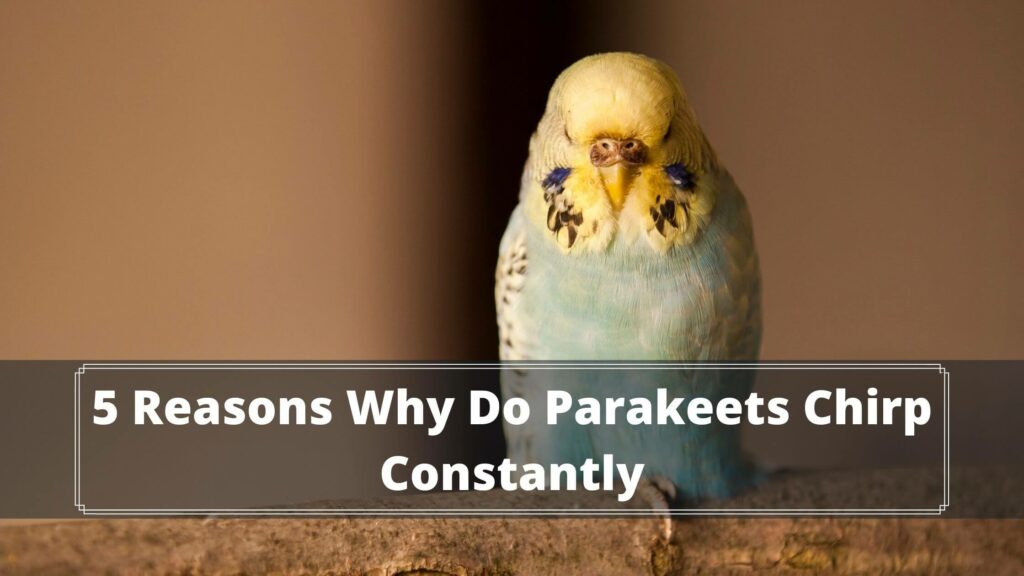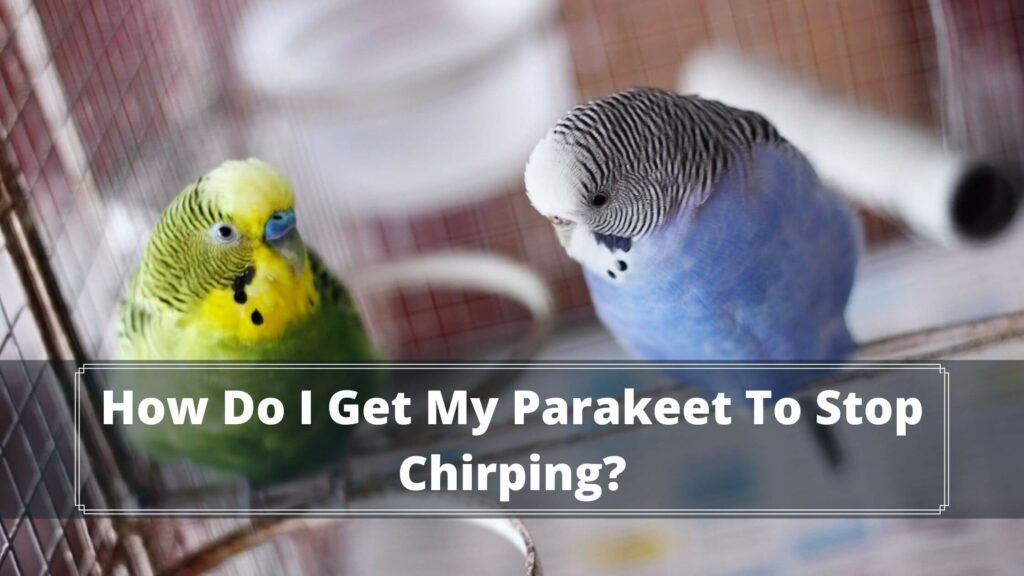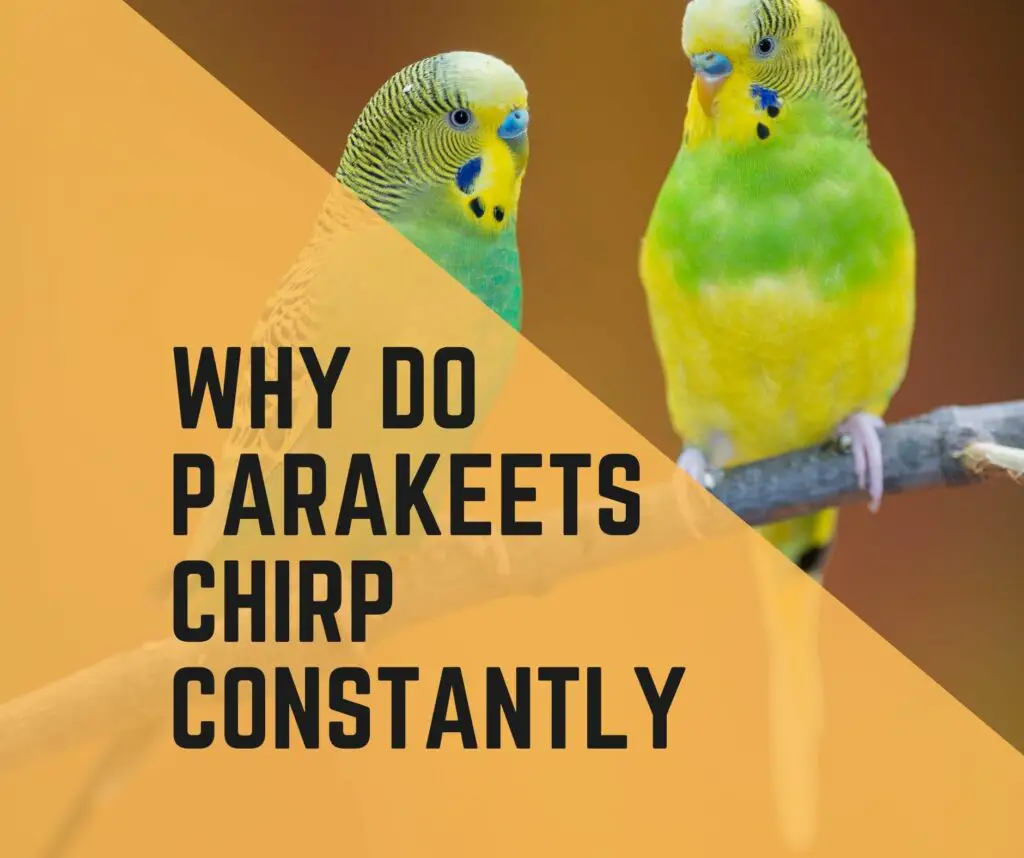A parakeet’s chirping can be very pleasing and sweet, particularly when you’re happy. However, it could be alarming if it’s ongoing. It’s fascinating to hear the chirping of any bird; however, what happens if a parakeet is constantly chirping.
In this article, I’ll address all your concerns about the constant chirping of your Parakeet at night and during the time of day.
It is crucial to pay attention to the variations in the sound when you listen. Many people aren’t aware of the syllables Parakeet use in their chirping; however, when you can discern whether the Parakeet’s chirping is in a single syllable or plural syllables, you’ll know what they’re experiencing.
It is crucial to understand what constitutes a repeated or different tone and whether it’s coarse or refined. The chirping of parakeets is associated with the concords, but many people are unsure if birds’ chirping sounds are like whistling or the sounds of metals.
Learning the chirping style of your Bird’s chirping will allow you to understand and retain them well. Chirping is a method of communication among all species of birds together. Sometimes, chirping can help the Bird break up and then fly away in no time, as a signal.
This article will help you’ll be able to learn the language and develop proficiency in understanding the chirps of parakeets. The cries of parakeets can be multifaceted and challenging to communicate with each other.
The sounds of parakeets or birds can be divided into two kinds of chirping and singing. Parakeets’ chirping is quite simple, but it can mean many things because it signals danger, warns, and communication. This is true for both the female and male parakeets.
On the other hand, the Bird’s singing is pleasing, enjoyable, and sweet due to the soothing sound. It is not uncommon to hear birds like parakeets singing during the season of mating to search for the right partner after having occupied an area. Why do parakeets are constantly chirping when they are in captive conditions? Let’s first find out why.
- Interesting Further Reading
- Can Parakeets Tolerate Heat? If So, How Much?
- All About Parakeets Making Noise & Sounds
- Can Parakeets Live Alone? + Do Parakeets Need a Companion
- All About: Parakeets Breeding Behaviour!
5 Reasons Why Do Parakeets Chirp Constantly

Here are five reasons why to keep parakeets in a constant state.
- Your Parakeet indeed has a sad face.
The combination of chirping, squawking, and screams indicate that something is incorrect. A parakeet may be angry about something, whether they share a cage with another bird or hear a constant hum. The reason could be anything; however, the Bird could be agitated if they make chirping and squeaking sounds.
- The Parakeet may be singing.
Most of the time, birds, including parakeets, typically chirp means they have an evocative voice, and it’s all there is. If you’ve kept any music or video on then, your Parakeet could be singing along to his favorite tunes or songs. It’s a normal thing that isn’t a problem for most pet owners since most birds are known to sing along to their favorite music.
- Your Parakeet may require your attention.
All pet birds, regardless of whether it’s a parrot or a parakeet, every Bird needs time with the owner they can trust. It’s straightforward. However, before you spend time with your parakeet or even come within its reach, be sure to check if the Bird is singing when you are within their sight or even when you’re absent.
Parakeets often look to interact with their owner, engage in conversations, or seek some tasty food. It is possible that your Bird could be trying for something from you or give you an idea with its chirping. It is essential to take time each day with your birds.
If you’re not taking the time to do this, then you should start because if your beloved Bird, such as a parakeet, is no longer feeling neglected or pampered by you, the excessive chirping or noise will stop eventually.
- Your Parakeet may smile through chirping at you with enthusiasm as you approach its area.
It is usual for parakeets to begin chirping when they spot their owner in their vicinity. It could be that your Bird has missed you often, causing it to keep tweeting. There’s nothing to worry about if your Bird is welcoming you with the sound of chirping.
- The parakeet could be joyous and happy.
If the Bird is constantly singing, it could indicate pure happiness or happiness. It’s common for happy birds that are content to sing in their singing voices. Being active social, Bird Parakeets in groups tend to be more prone to continuous choruses during grooming or meals.
9 Reasons Why Do Parakeets Chirp At Night?
There are many reasons why birds chirp during the night. In this article, I will provide a list of 9 main reasons that birds chirp during the night.
- The Parakeet has been practicing to sing.
It is usual for parakeets to practice making their bird calls, and parakeets typically chirp at night to improve their singing. If your Bird is young or juvinile, it’s common to imitate singing sounds or songs of their parents. If they are training to sing, there’s not something to worry about.
It’s a crucial social ability for Parakeets for them to be able to talk and stay alert to each other within the natural environment. Furthermore, the ability to sing is essential to your survival out in nature too. Aside from that, male Parakeets may sing in the nighttime to attract a partner or claim territory.
- Parakeets could be mimicking the birds that chirp in the night.
Many of the birds that migrate fly in the night as the moon and stars high in the sky assist them in navigating. The sounds of chirping encourage pets-birds like parakeets to sing too.
There are times when you’ve heard birds migrating, chirping a frequently in-unison in-flight call. It’s common to listen to the chirping of birds’ flight calls because it serves as a strategy to work together for the birds. If your Bird is outside or is kept outdoors at night, it’s not unusual to hear them mimicking calling birds that migrate.
- Parakeets could be at risk.
A parakeet may also chirp whenever it feels in threat at night. When confronted with a frightening or alarming situation, the Parakeet is likely to be extremely loud, mainly when Predators are around. Every Predator attack or ominous sound can cause a parakeet to become anxious and start chirping loudly in alarm.
Additionally, the chirping habits of your pet bird also assist others birds living in your area to recognize the possibility of threat. Often the other birds respond to this type of alarm noises of parakeets since they tend to create an effect that ripples across the frequency of chirping.
- Male Parakeets could be looking for mates.
Chirping is a routine for many birds to locate suitable partners in the surroundings. In spring, male parakeets tend to be highly active to catch the attention of female Parakeets. If you notice that your male Parakeet is singing a lot at night, it could be the reason for hearing these complex songs late at night.
- Parakeets are known to chirp frequently in the night when they are claiming territories.
Parrots or Parakeets tend to establish their colonies and are very cautious to live longer. For parakeets like parrots seeking shelters that provide the best water source, food sources, and nesting spots can be the most desirable place.
When a bird finds the right spot, it’ll always want to hold on to the site. Chanting and singing are preferred methods to let other birds know that their territory is theirs.
Parrots and parakeets are known to chirp to establish boundaries for the area by singing frequently. If you’ve had an bird in a cage with your Parakeet, it is likely to be loud and make noises to scare the newcomer away.
- In the evening, a parakeet will begin to chirp when they get excited over their food.
If their favorite food is in the market, they’ll be making all kinds of chirping sounds. Additionally, since they are active birds, it is typical for chirping to signal their cage mates about the availability of a new or preferred food source.
If many birds live in the same cage, they may be heard chirping and squabbling when fighting over tasty food. Male birds are known to chirp often when they have the food they can offer to their female companions or spouses. Parakeets can also tweet quite a bit because of their extra food intake and energy.
- Your Parakeets are baby birds.
It is usual for nestlings and hatchlings of parakeets who chirp constantly. Birds of all ages often chirp to ensure they receive continuous attention and care from their parents. Like humans, newborn birds cry and inform their parents that they require food, awareness, or tension.
If you notice a lot of nestlings and hatchlings, who chirp, ensure that you provide ample food, as their parents could be able to tweet when they aren’t getting enough food available to feed their mouths.
In the absence of parents, the hatchlings and nestlings of parakeets are loud and constant in their chirping to inform parents that they’re alone.
A chirping sound from nestlings or hatchlings and youngsters could mean that they’re cold, excited or scared, sick, bored, hungry, or hurt. They may also be thirsty, ill, or injured.
- If your parakeets are active during the day, they can experience disorientation.
Uncertainty can lead your pet parakeets to sing and frequently chirp in the evening instead. The main reason for this type of chirping is thought to come from light pollution.
When you have your parakeet outdoors, light pollution from streetlights, loud sounds, or any abrupt movement could confuse your birds. Since birds cannot discern between natural daylight and artificial light, it could trigger them to sing and chirp in the early morning.
- If you have a large group of parakeets in your home or outside, they’ll begin to chatter next to one the other.
It’s been discovered that birds tend to exhibit this sort of thing in conducting a bird census. When many birds or parakeet are collected in a particular area, the amount of chirping or sounds helps determine the number of birds they have.
When they have a clear picture of the number of their flock, they will appreciate the fact that it isn’t straightforward. It is to fight with other species for food, shelter, water, and other sources.
- Recommended Further Reading
- Can Parakeets Talk? If So, What Percentage & Age?
- Are Parakeets Endangered? If So, Why & What Species
- All You Need To Know About Parakeets Mating
- Can Parakeets Fly? If So, How Far?
How Do I Get My Parakeet To Stop Chirping?

To stop your Parakeet from chirping, You must determine the reason that causes your Bird to panic. There are many reasons why your bird chirps and tweets late into midnight. But, whatever the cause, you could test a few tricks I’ve listed below to calm your pet down.
When you’ve discovered a technique that is effective for your bird so that they stop chirping and making noises, you will rest well at night. And so will your pet.
Talk to your pet’s Parakeet.
As I’ve said, all pet birds need attention to receive your appreciation often; they will chirp. It’s their way of telling that they want to spend some time to be with you.
It’s best to greet him with a quick and straightforward goodnight-message in the evening to let your pet know that they are always with you for them, and you’ll be there for them in the morning too.
Do not interact with your pet too much since it will cause them to become more excited, leading to more chirping and singing. A simple greeting and a short good night can help significantly.
A lot of owners have recommended that you chirp back at your pet. Try this method and then test whether it works or not. If it doesn’t work, you can try the second approach.
Protect your cage from the elements with an air-tight, dark cloth.
As we mentioned earlier, artificial light may confuse your Bird. The cage should be covered to aid by either reducing the noise slightly or helping your birds realize it’s time to rest. I suggest you not muffle the noise and focus on using a darker but air-tight cloth.
Do not shut off the cage of your pet’s Parakeet as they will require air to breathe. If this doesn’t work, or if your Parakeet won’t stop chirping at the end, it’ll maintain the sound level slightly.
You can train your pet to stop chirping in the evening.
It is best to spend a lot of time training your pet’s Parakeet so that it can stop the nighttime leak chorus. Start teaching the parakeet to remain quiet and then offer him a treat if he does comply.
This could take some time, but you should try to convince your Parakeet to reward him with his favorite treat to take.
We Recommended practicing this type of exercise for a short period of hours and arranging some lessons in the future, to see how it can help your Parakeet into a better group for bedtime or keep them quiet during the night.
It is essential to keep the room sounds to a minimum.
If you’ve kept your television or radio on in the evening, the noise it makes can cause your Parakeet to chirp frequently and emit noises.
Every sound coming from your home, whether it’s the shower running, toothbrush buzzing, or your hairdryer blowing, everything can keep your pet birds awake throughout the night and will even make them mimic the tune.
It is best to reduce your nighttime routine noises at night to a minimum or provide your pet its own space away from such distracting sounds. This could also mean that you will have to ultimately relocate your bird’s cage or move his cage each day.
When all else fails, the white noise machine is a great option.
You can purchase a high brand of white noise device or earplugs that block the Parakeets from chirping.
Make sure your pet doesn’t be able to hear or feel the device’s sound also, as it could aggravate the situation.
Many owners feel uncomfortable installing white noise machines but don’t let it be since parakeets usually communicate with themselves.
FAQ

Hi, There and Welcome to BirdsNews.com, is here to help you learn and care about pet birds. and this blog is a journal of everything I’ve learned.

